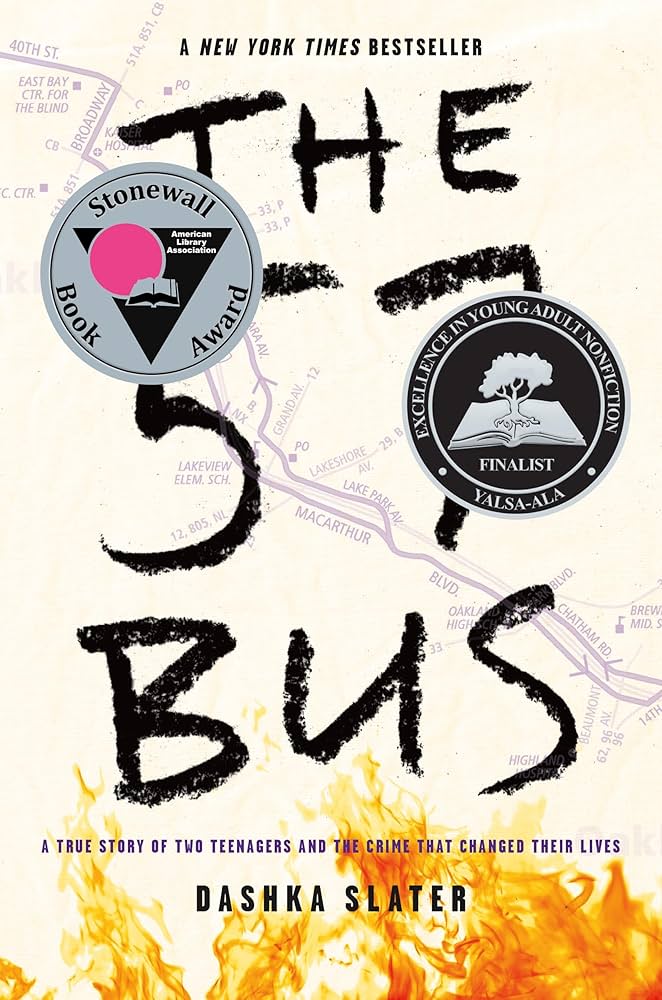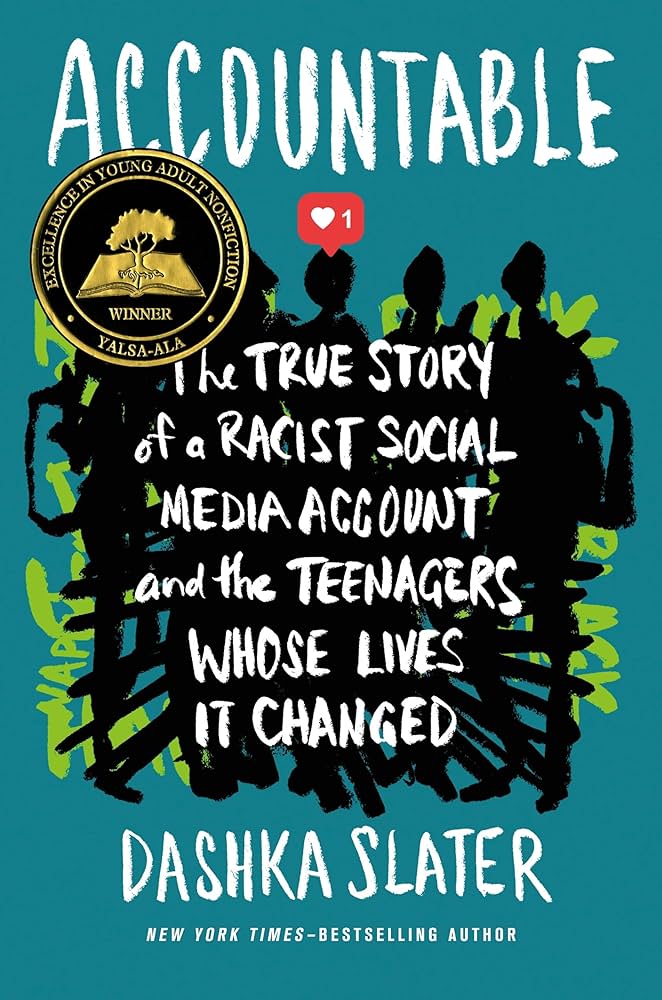Dashka Slater
Writer
United States

By Juliette Verlaque, June 2023. Originally published in Art Is Power: 20 Artists on How They Fight for Justice and Inspire Change.
In 2017, American author Dashka Slater published The 57 Bus: A True Story of Two Teenagers and the Crime That Changed Their Lives, about an agender teen from Oakland whose skirt was set on fire by another teenager on a bus ride. Four years later, in the midst of a national wave of book bans, Slater began receiving a flood of “desperate pleas” from kids, parents, and librarians as her book was quietly removed from classroom shelves and libraries around the country. The conservative lawmakers and parents’ groups behind the bans deemed The 57 Bus controversial because of its portrayal of LGBTQ+ youth and identities—and it has since become the 10th-most-banned book in Texas and the 35th-most-banned book in the United States. “It’s astonishing how quickly it happened,” Slater says. “I feel like I haven’t even known what to say about it, because it’s so absurd.”
The 57 Bus is based on an article that Slater wrote for The New York Times Magazine in 2015 about Sasha, an agender teenager with autism, and Richard, a Black teenager from a low-income neighborhood who set Sasha’s skirt on fire one day when they were riding the same bus home from their very different high schools. Sasha’s legs were severely burned, and they spent three weeks in the hospital, while Richard was charged as an adult with two serious felonies, each with hate crime enhancements. The case drew an outpouring of solidarity and news coverage from across the United States and the world.
The crime happened in Slater’s neighborhood, and after learning about it from her neighbors, she immediately felt personally invested in covering it. She hoped that her power as a reporter could help bring more attention to the case, the criminal justice system, and the challenges currently facing young Americans. “The whole time I was writing the story,” she recalls, “I had this idea that I wanted to write it a different way… as a true crime novel for young adults.”

She has been writing since she was a child and always dreamed of becoming an author. After graduating from college, she began working as a staff writer for The East Bay Express, a small weekly newspaper, and she stayed for more than a decade. In 2000, she published her first fiction book, her sole novel for adults. She spent the next few decades working as a freelance reporter and finding success as a children’s book author. Slater says that much of her writing has centered on issues of legacy, inheritance, and responsibility. “I’m really interested in the ways in which we take what we have inherited,” she says, “and have this choice about whether to make something new, or to keep on the track that came to us and what our responsibilities are to the past.”
When approaching works of narrative nonfiction like The 57 Bus, Slater relies on both her training as a journalist and her sensibilities as a storyteller. “It’s the work of a journalist, but it’s also the work of an artist because I’m trying to tell the story in this very creative way,” she says. “I felt like their quest to create their own story would be immediately identifiable for any young person.… The issues of race, gender, and justice are incredibly germane to young people, who are always thinking about what is justice, what is fair, what are your personal ethics. It’s a book that has really resonated with young people—just not so much with book banners.”
When The 57 Bus was first published, Slater worried that it would face a backlash—particularly for featuring an agender protagonist and using they/them pronouns throughout the book, as well as for sharing the perspective and experiences of the young teenager who committed this impulsive act of violence and was subsequently charged with a hate crime. But at first, the reaction to The 57 Bus was overwhelmingly positive. The book received numerous awards, including the Stonewall Book Award, and was listed in Time magazine’s ‘100 Best YA Books of All Time,’ alongside luminary works like To Kill A Mockingbird and Little Women.
Then, in 2021, Slater received word that a parent in Rhode Island had requested that The 57 Bus be removed from her child’s curriculum. Over the next few months, she began to hear from kids, teachers, and parents that her book was being banned in schools across the country, largely due to its portrayal of LGBTQ+ characters and its inclusion of a glossary of terms related to gender and sexuality. It is one of many books that have been subject to an increasingly insidious campaign across the United States to remove books from school and library shelves, orchestrated by state lawmakers, parents, and community groups, often under the guise of protecting children and upholding family values.
According to PEN America, while book bans have occurred throughout American history— notably during the McCarthy era and under President Ronald Reagan in the 1980s—the scope of today’s bans is much wider than ever before, owing to the involvement of right-wing state lawmakers as well as organized conservative groups. The movement is closely intertwined with other recent developments in American politics, including the rise of movements against masks and virtual school during the COVID-19 pandemic; panic over drag queen story hours; disputes over “critical race theory”; and fundamental disagreements over how American history should be taught in classrooms and what children should be able to learn about issues ranging from LGBTQ+ experiences to sex education. From July 2021 to June 2022, PEN America’s Index of School Book Bans found 2,532 instances of individual books being banned, affecting 1,648 unique titles. The vast majority of these books feature LGBTQ+ characters or characters of color and relate to LGBTQ+ identities, sex education, or race and racism in American history
“Artists are usually the first ones in the crosshairs in any march towards fascism. Artists are the canaries in the coal mine… and we have a special role to play in sounding the alarm and pushing back against the forces that want to make us be quiet.”
“I don’t think any of us expected that we would be in this place” in the United States, Slater says. “But we are dealing with autocracy… We’re looking at state laws that make it impossible to read books that tell the truth about history” and “real people who live in the world. Artists are usually the first ones in the crosshairs in any march toward fascism. Artists are the canaries in the coal mine … and we have a special role to play in sounding the alarm and pushing back against the forces that want to make us be quiet.” Since the onslaught of book bans in 2021, most requests to remove The 57 Bus have been levied on the basis of being “obscene” or “pornographic.” As Slater points out, however, “there’s no sex in the book. There’s not even a kiss. There’s some ballroom dancing. That’s it!” But she knows that the book’s portrayal of Sasha and other LGBTQ+ characters is enough to make it a target for book banners. “These folks aren’t really worried about obscenity,” she says. “They believe that the existence of queer and trans people is obscene. And so any book that has a queer person in it is going to be challenged as being obscene.”
For Slater, the bans have been deeply painful—she feels especially distressed on behalf of the countless readers. Since the book’s publication, she has received hundreds of letters, many from kids and adults who see themselves in the book’s characters: trans and nonbinary people, those who have been mistreated by the criminal justice system, autistic people. Others write to say that they had little to no experience with Black people, openly queer people, or those from low-income neighborhoods and that the book opened their eyes to new experiences and perspectives. “I love hearing from everybody,” Slater says. “But often those messages from kids who are getting some insight into somebody else’s experience for the first time—those are really moving. They’re really thinking in a way they hadn’t been thinking before.”

Slater thinks that The 57 Bus draws its power in part from the fact that it is a work of narrative nonfiction, which challenges readers’ preconceptions—particularly about crime and the criminal justice system—while allowing them to reach their own conclusions. Slater says she pointedly sought to interrogate the preconception that “all criminals are bad” and have been tried fairly by the system—a perception that she has found to be especially common among young people, unless they themselves have been personally impacted by the criminal justice system. “Young people are very skeptical of being preached at,” she says. “Gen Z is so incredibly smart and sophisticated, as well as being compassionate and activist. But if they feel like they’re being manipulated or the conclusion of the book was preordained and they’re supposed to be manipulated to feel a certain way, they’re not having it… And I’m the same way. I don’t claim neutrality, but I do claim an enhanced subjectivity. I want to show everyone different perspectives. And kids respond to that, because it allows them to draw their own conclusions and also challenges them.”
The letters from communities where the book was banished were among the most poignant. “Often I hear from a parent who says, ‘Your book was so important in my family, and I can’t believe that it would be taken out of the library,’” Slater says. She struggles with the position that the book is being removed to protect family values, when she sees it as a celebration of the family values that she—and her readers—hold dear. “I hear from families all the time about how my book helped the family have important discussions about race, gender, and justice,” she says. “Often parents read it along with their kids, or sometimes kids will give it to their parents and say, ‘I want you to read this so that you can understand me better.’ I feel like my book is actually promoting family values and certainly what my family values are, which is families that communicate and have important discussions and find ways to support each other.”
Slater is now gearing up to publish her next book, Accountable: The True Story of a Racist Social Media Account and the Teenagers Whose Lives It Changed. Due in August, it will explore complex and timely themes, including structural racism, online harassment and hate speech, and white supremacy. “It’s about all of these things that get people hot and bothered right now,” she says. Through Accountable, Slater aims to provoke a new generation of young people to examine the history of racist symbols and structures in the United States. As she puts together her marketing and publication strategy, she is intent on making sure that Accountable can reach kids in the schools where it is most likely to be banned. “I expect that there will be a different reaction in this climate, and there will be some people who push back against it pretty fast,” she says. “But this idea that we’re protecting families or protecting children by removing a book from the library—it misses the fact that for many families and for many children, these books are their literal lifelines.”
“This idea that we’re protecting families or protecting children by removing a book from the library – it misses the fact that for many families and for many children, these books are their literal lifelines.”






